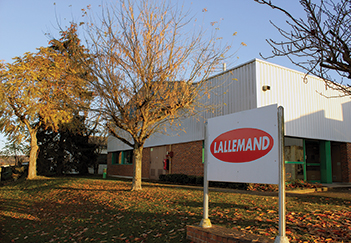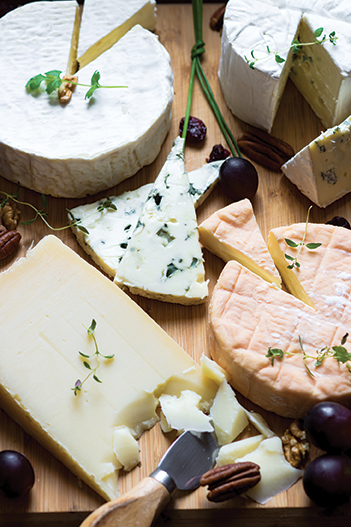 |
|||

|  |

|
|

Lallemand Specialty Cultures offers solutions to match industry trends
Editor’s note: Welcome to Ingredient Innovation, CMN’s new segment exploring recent innovations and trends in the dairy ingredients sector. For this segment, we will profile a leader in the ingredients industry as well as share updates on mergers and acquisitions and new offerings for cheese and dairy in ingredients — where flavor begins.
|
Photo courtesy of Lallemand Specialty Cultures |
SPECIALTY CULTURES — Lallemand Specialty Cultures (LSC) is a global leader in the development and production of specialty cultures for the dairy industry. “Our solutions allow us to help our customers create new and innovative cheeses by adjusting the dosage and combining different cultures to reach new markets and consumers,” says Julien Gadbin-Dherbécourt, dairy cultures and technology expert at LSC. |
 |
| Photo courtesy of Lallemand Specialty Cultures |
| INNOVATIVE SPIRIT — Lallemand’s dedication to research and development (R&D) is a testament to its innovative spirit, underscored by significant R&D investments and a workforce of 5,000 employees across the company. |
By Alyssa Mitchell
BLAGNAC, France — Lallemand Specialty Cultures (LSC), a division of France-based Lallemand Inc., offers a range of ingredient solutions so customers can adapt to the changing trends and demands of the dairy landscape.
Headquartered in Montreal, Lallemand specializes in the development, production and marketing of microorganisms and their derivatives for a wide range of industries including animal nutrition, baking, bio-ingredients, biofuels, brewing, cosmetics, health solutions, oenology, pharma, plant care and specialty cultures.
Lallemand’s dedication to research and development (R&D) is a testament to its innovative spirit, underscored by significant R&D investments and a workforce of 5,000 employees across the company, officials say. The team’s foundation of excellence and family values underscores its focus on customer support, product development and contamination resolution through advanced microorganism identification.
“With a century of fermentation expertise, LSC offers comprehensive services and premium cultures, delivering innovative solutions to customers worldwide for a variety of fermented food applications,” says Julia Plateau-Gonthier, dairy, meat and plant-based category manager at LSC.
Plateau-Gonthier notes LSC shares Lallemand’s philosophy of “Cooperation Spells Success,” emphasizing its partnership approach to working alongside customers to develop value-added dairy products and alternatives.
“This strategy has fostered long-lasting relationships and a deep understanding of market needs, leading to tailored solutions,” she says. “In the dynamic dairy industry, our collaborative microorganism solutions are crucial for maintaining a competitive edge, leveraging a wealth of knowledge and innovation.”
• Specialty cultures
LSC is a global leader in the development and production of specialty cultures for the dairy industry, offering a wide range of solutions that address the specific needs of customers in terms of final product differentiation, quality and food safety.
Food safety is a paramount concern for the dairy sector, as consumers demand products that are safe, wholesome, and free of pathogens and spoilage microorgamisms, notes Julien Gadbin-Dherbécourt, dairy cultures and technology expert at LSC. LSC provides cultures that enhance the safety of dairy products by inhibiting the growth of harmful bacteria such as Listeria monocytogenes, but also spoilage microorganisms such as yeasts and molds, allowing shelf-life extension.
“Consumers expect products that have a regular and appealing appearance, texture and flavor each time they purchase,” he says. “Therefore, consistency is another key factor for the dairy sector. By meticulously selecting strains that produce specific enzymes or aroma compounds in defined dairy conditions, LSC provides culture solutions as single strains or blends of strains that ensure consistency of desired surface and ripening profiles.”
LSC sets itself apart from its competitors by offering tailor-made solutions that meet the specific requirements of each customer and each product, Gadbin-Dherbécourt adds.
“Our portfolio consists of proprietary cultures that offer singular benefits and advantages to our customers. In addition, we have a dedicated team of sales and technical experts who work closely with our customers to understand their needs, challenges and expectations. Finally, our state-of-the-art research and development center allows us to constantly innovate and develop new solutions that address the current and future trends of the dairy market,” he says.
One of LSC’s offerings is its FLAV-ANTAGE line, a range of specialty surface and ripening cultures that enhance the flavor, texture and color of dairy products, especially cheeses.
FLAV-ANTAGE LN2 is a Leuconostoc mesenteroides culture designed for Blue cheese production. It efficiently and robustly opens the curd, allowing optimal Blue mold development, Gadbin-Dherbécourt says. Main features include controlled gas production, uniform distribution, aromatic development and a vivid blue color, adding to the cheese’s visual appeal.
Meanwhile, FLAV-ANTAGE BLB1 is an innovative solution for washed-rind and smeared-ripened cheese producers. With a carefully selected strain of Brevibacterium aurantiacum from Lallemand’s extensive cell bank, FLAV-ANTAGE BLB1 represents LSC’s latest innovation meeting specific market demands, providing a natural alternative for vibrant brown color rind and intense cheese flavor. The brown color that is produced is a natural alternative to additives like caramel used as food coloring, which allows a clean label, Gadbin-Dherbécourt notes.
“These solutions offer a combination of flavor and texture enhancement that is unmatched by any other culture. They also offer a high level of performance and reliability, as they are carefully selected and tested for their compatibility and stability with different milk types, cheese technologies and ripening conditions,” he says.
LSC notes its FLAV-ANTAGE line is addressing current demands from dairy manufacturers by offering microbial solutions that help them to create value-added products that stand out in the competitive dairy market. The line helps dairy manufacturers enhance the sensory appeal of their products. It differentiates their products from their competitors; optimizes their production processes by using cultures that are easy to handle, stores and is compatible and stable with different milk types; reduces their production costs; and meets consumer expectations for natural and clean label products by using cultures that are natural, safe and do not require any artificial additives or preservatives.
LSC’s LALCULT Protect line of solutions also is in high demand as it offers a range of bioprotective cultures that provide safety and quality for dairy products, the company notes.
Since the launch of LALCULT Protect LC1 — a culture that helps control the growth of Listeria monocytogenes in cheese — LSC has continued to develop and improve its LALCULT Protect range by adding new solutions that address the specific needs of its customers and the market.
One recent addition to the line is LALCULT Protect MC1, a solution to control mold and yeast growth in dairy products.
“This helps extend the shelf life of dairy products, providing a cost-effective and efficient solution for producers,” Gadbin-Dherbécourt says. “By implementing LALCULT Protect MC1, companies can ensure the safety and quality of their products while maintaining consumer trust and brand reputation.”
As a global leader in the development and production of specialty cultures for the dairy industry, Gadbin-
Dherbécourt notes LSC also is investing in the growing demand for plant-based alternatives to dairy products such as vegan cheese and yogurt.
“Our know-how in microbiology and fermentation as well as our long-standing experience selecting the best cultures for dairy and meat applications is a strong asset for the development of plant-based cultures,” he says. “Sometimes, they require tailored solutions distinct from traditional dairy cultures. As a result, we offer a comprehensive range of plant-based solutions designed for vegan cheese. These solutions offer benefits and advantages similar to our surface and ripening dairy solutions. Additionally, we provide dedicated starter and bioprotective cultures for plant-based products.”
• A range of solutions
Cheese is a very diverse and evolving product that can be made from different types of milk, such as cow, goat, sheep or buffalo, and from various processes, resulting in hard, semi-hard, soft and fresh cheeses, Gadbin-Dherbécourt notes.
“Each variety of cheese has its own characteristics — such as flavor, texture, color, shape and size — that depend on the type of milk, the cheese technology, and the ripening conditions and cultures,” he says. “Our solutions allow us to help our customers create new and innovative cheeses by adjusting the dosage and combining different cultures to reach new markets and consumers. By offering a range of solutions, we can also adapt to the changing trends and demands of the cheese market, such as the increasing popularity of specialty cheeses, the growing demand for natural and clean label products, and the rising consumer preferences for different flavors and textures.”
In the United States, the market for specialty cheeses is expanding at a more rapid pace compared to commodity cheeses, Plateau-Gonthier adds. An increasing number of consumers are developing a taste for the distinctive flavors, appearance and textures that specialty cheeses offer.
“This trend reflects a growing culinary curiosity and a desire for gourmet experiences among the American people, driving demand for cheeses with a rich and authentic character,” she says.
CMN
| CMN article search |
|
|
© 2025 Cheese Market News • Quarne Publishing, LLC • Legal Information • Online Privacy Policy • Terms and Conditions
Cheese Market News • Business/Advertising Office: P.O. Box 628254 • Middleton, WI 53562 • 608/831-6002
Cheese Market News • Editorial Office: 5315 Wall Street, Suite 100 • Madison, WI 53718 • 608/288-9090
